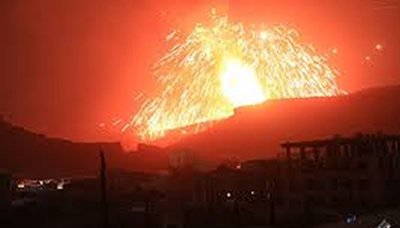Al-Sabah Al-Yemeni
USA Kills Yemeni People”, screams graffiti plastered on walls in Yemen’s capital Sana’a. The Yemeni people who have been on the receiving end of US bombs dropped by Saudi pilots know all too well that the United States is complicit in their suffering.
The intense anti-US sentiment in Yemen should be a wake-up call for Americans: if you don’t care about the millions of suffering Yemenis, you might think about the future blowback.
Two US Senators, the Republican Rand Paul and the Democrat Chris Murphy, understand full well the implications and have been trying to halt the weapons sales. “The United States has no business supporting a war that has only served to embolden our terrorist enemies, exacerbate a humanitarian crisis, and incite fear and anger among the Yemeni people toward the United States. This will come back to haunt us,” warned Murphy.
Unfortunately, the Trump administration and the majority of US senators have failed to heed their call. On 13 June, their resolution to stop the Saudi sale of precision-guided munitions was narrowly defeated by a 53-47 vote.
Yemenis are desperate to end this conflict, now in its third year. Nearly 19 million people require assistance and 6.8 million are at risk of famine. This has been compounded by a cholera outbreak that has surpassed 124,000 cases and is projected to double every two weeks. Almost half the country’s medical facilities have been destroyed. A Yemeni child dies every 10 minutes from the combined effects of hunger and lack of medical facilities.
Saudi forces have targeted farms, food facilities, water infrastructure, marketplaces, and even the port of Hudaidah, where most of the humanitarian aid was entering the country. Meanwhile, extremist groups such as al-Qaida and Isis have seized upon the chaos to expand their reach.
The United Nations Security Council is now making another attempt to address the conflict, calling on all parties to allow unhindered access to humanitarian supplies, to keep all ports functioning (especially the critical port of Hudaidah, which the Saudis have threatened to take from Houthi control), and to make a good-faith attempt to find a political solution.
This is where the United States should be putting its efforts. People in the region understand that until there is a serious US interest in a political solution, it won’t happen. Even if Trump is only interested in “putting America first”, he would do well to stop being involved in dropping bombs on Yemenis and instead use his “art of the deal” to join with the United Nations in ending this catastrophic conflict.
The Guardian
خليك معنا

